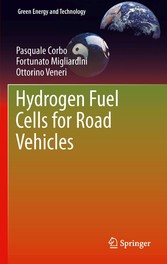Suchen und Finden

Hydrogen Fuel Cells for Road Vehicles
Hydrogen Fuel Cells for Road Vehicles addresses the main issues related to the application of hydrogen fuel cell technology in the road transportation sector. A preliminary treatment is given on fuel resources and atmospheric pollution concerns which are closely related to the current technology (internal combustion engine) used for moving people and goods. The authors deal, in particular, with the problems that can hinder a widespread hydrogen market (production, storage and distribution), as well as giving an analysis of fuel cell technologies available for utilization of this energy carrier in the automotive field. Hydrogen Fuel Cells for Road Vehicles also examines the concerns faced during the design and realization of a PEM fuel cell system with optimal size and efficiency, evidencing the impact of the individual auxiliary components on energy losses and dynamic stack performance. The book ends with the analysis of two practical case studies on fuel cell propulsion systems. Hydrogen Fuel Cells for Road Vehicles is a useful text for researchers, professionals and advanced students in the fields of automotive and environmental engineering.
Pasquale Corbo graduated in Chemistry at the University 'Federico II' of Naples, where he received his PhD in Chemical Sciences in 1987. He is currently Research Manager at the Istituto Motori of the Italian National Research Council in Naples. He has been responsible for research projects financed by private companies (Fiat Research Center, STMicroelectronics, Magneti Marelli, Eldor Corporation) and Italian public institutions (ENEA, Ministry of Education, University and Research, Ministry of Economic Development, Tuscany and Campania Regions) in the fields of heterogeneous catalysis, hydrogen and fuel cells for automotive applications. He has published about 150 papers in international scientific journals and in proceedings of international conferences and one Italian patent. Fortunato Migliardini is currently Researcher at the Istituto Motori of the Italian National Research Council in Naples. He graduated in Chemical Engineering at the University 'Federico II' of Naples, where he received his PhD in Thermo-mechanical System Engineering in 1998. His experience is mainly focused on hydrogen catalytic production, hydrogen storage methods, hydrogen fuel cell systems and related integrated plants for automotive and residential applications. He has published over 50 papers in international scientific journal sand in proceedings of international conferences. Ottorino Veneri graduated in Electrical Engineering from the University 'Federico II' of Naples, where he received his PhD in Electrical Engineering in 2000. He currently works as Researcher for the Istituto Motori of the Italian National Research Council in Naples. His main fields of interest are the electric drives for transportation systems, electric energy converters, electric energy storage systems and power sources with hydrogen fuel cells. He has published about 50 papers in international scientific journals and in proceedings of international conferences.
Alle Preise verstehen sich inklusive der gesetzlichen MwSt.




















